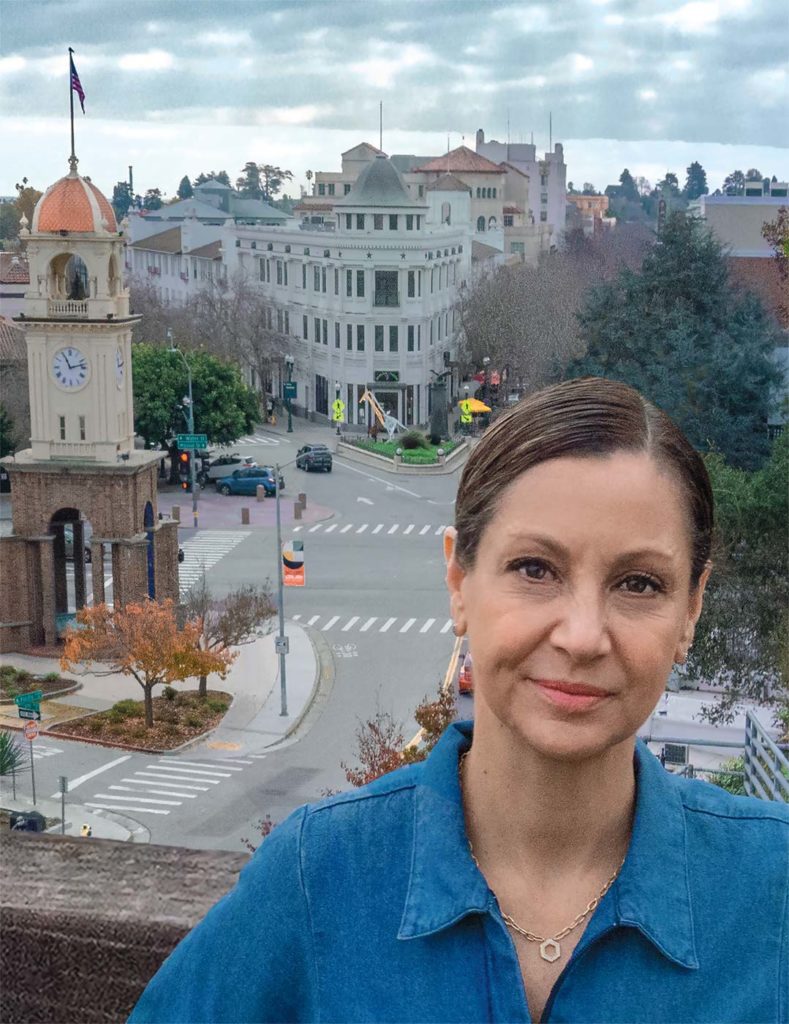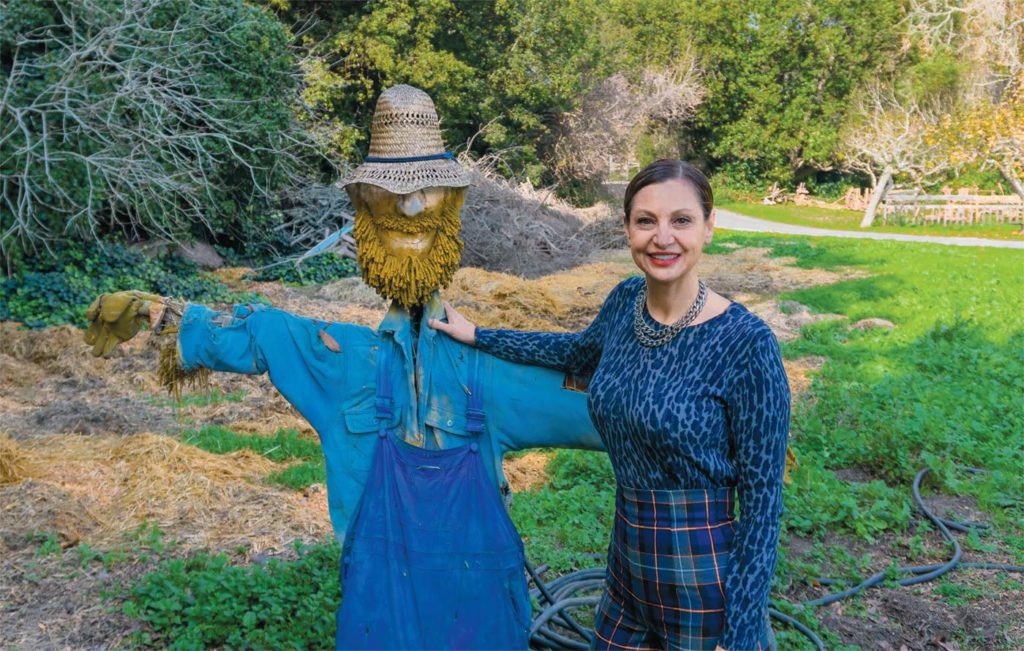PHOTOGRAPHY BY JEFF BAREILLES

Santa Cruz woman helps big business work toward a sustainable food system
Santa Cruz native Maisie Ganzler’s calling as an environmental and social activist wasn’t part of her original career plan, but it actually dates back farther than she remembers—back to when she was an infant.
As the story goes, before Wilder Ranch was a state park, it was a self-sustaining dairy farm and cattle ranch. When the Wilder family couldn’t make ends meet running the property, it was sold to a land development company that planned to build luxury housing, a golf course and shopping centers there. In protest, Ganzler’s parents and other concerned Santa Cruz residents formed Operation Wilder to block the development. Baby Maisie also participated, though unknowingly. During public hearings to decide Wilder Ranch’s fate, her mother openly breastfed her new daughter as a disruption strategy, an illegal act in California until 1997.
Ganzler describes her parents as “bohemian.” They worked in the nonprofit sector and partied with counterculture types at their downtown Victorian-style home. While attending Santa Cruz High, she worked at the Dolphin Restaurant on the Municipal Wharf and, like most kids, wasn’t totally on board with her parents’ lifestyle. Her act of rebellious angst was to leave Santa Cruz and attend Cornell University’s prestigious School of Hotel Administration. Her ultimate act of defiance was to pursue a career in the for-profit business world.
“I wanted to focus on restaurant service, not social service,” says Ganzler.
One year after graduating, Ganzler joined Palo Alto-based Bon Appétit Management Co. (BAMCO), an on-site restaurant firm offering full food service management to corporations, museums, colleges and universities, and part of the multinational Compass Group.
“I set my sights on Bon Appétit after reading an article in a trade magazine about the company’s innovative restaurantstyle approach to food service,” Ganzler recalls. BAMCO’s cutting-edge approach in 1994 was serving seasonal, locally sourced food. The job allowed her to return to Santa Cruz, where she now lives just a few blocks away from where she grew up. Ganzler loves being able to walk to visit friends, go to movies or dine out.
As vice president of strategy and brand officer at BAMCO, Ganzler oversees the food service company’s supply chain and purchasing standards. Together with CEO Fedele Bauccio she leads the operation of 1,000-plus client sites across the U.S., at which each kitchen prepares meals from scratch, emphasizing seasonal ingredients sourced locally. In addition, each chef has their own network of direct supply relationships within their respective communities.
The names of some of the clients she is charged with may ring a bell. Google, Oracle, Twitter, the Getty Center and UCSF are all on her plate. In 2019, BAMCO served 250 million restaurant-quality meals for clients in 33 states.

Conscious or otherwise, Ganzler admits that some of her parents’ beliefs took root.
“The value my parents put on community seeped in somehow,” she says with a laugh. “I only cringe slightly when I hear myself quoting my mother’s frequent invocation of the Buddhist Eightfold Path and saying my work at Bon Appétit is ‘Right Livelihood.’”
As a result, BAMCO operates very differently to other national food service companies.
“In order for us to protect our planet, resources and communities, sustainability must cross all lines—geographic, political, racial and economic,” Ganzler says.
A prime example is its Farm to Fork program, which she was instrumental in creating in 1999. It was the first national program by any restaurant food service company that committed to purchasing at least 20% of all food served from purveyors located within 150 miles of its restaurants and cafés. That translates to 50 million meals a year that support small, independently operated organic farms, butchers, bakers, fisheries, dairies, hatcheries and artisan makers.
“I take great pleasure in pushing the company forward and proving that a for-profit business can act with both a warm heart and a scientific mind,” Ganzler says.
Other practices she initiated at BAMCO include: launching nationwide programs and policies that forbid the use of antibiotics or growth hormones in meat and poultry products; switching to Certified Humane ground beef; phasing out pork raised in gestation crates; requiring the purchase of superficially imperfect but entirely edible fruits and vegetables; mandating the exclusive use of Certified Humane and cage-free eggs; and implementing programs to reduce carbon emissions, while raising awareness about the many ways that food production and greenhouse gases are linked.
Also, she has joined farmworker marches for rights, respect and fair working conditions, followed by the creation of BAMCO’s code of conduct, which demands the company’s suppliers ensure fair treatment and wages for all farmworkers. At the same time, BAMCO collaborated with United Farm Workers and Oxfam (a global organization that fights inequality to end poverty and injustice) to create the Equitable Food Initiative— a program with rigorous standards for labor practices, food safety and pest management.
BAMCO’s innovations and initiatives have rippled through the food service sector as competitors try to keep up, multiplying its impact over and over.
COVID halted all food service at BAMCO’s clients’ sites. Imagine serving 250 million meals one year and the next, all 1,000-plus venues close, reopen, close and reopen. Yet, the company remained agile amidst the chaos, anticipating how its services and operations would need to evolve and adapt to the new normal.
“During the ‘downtime,’ we were focused on many different areas that help us make decisions that meet our standards or meet certain environmental goals,” says Ganzler.
Not surprisingly, BAMCO chose to focus on technology by building new tools like its appenabled ordering system, Curated, that allows guests to pre-order meals to their specific dietary needs, may they be vegetarian, vegan or around allergens. Then by using some of their closed kitchens, they can prepare and serve these meals efficiently and effectively.
“I take great pleasure in pushing the company forward and proving that a for-profit business can act with both a warm heart and a scientific mind.”
Another new technology is its Food Standards Dashboard, an internalfacing tool that helps chefs make menu decisions that meet company food standards and environmental goals. The dashboard also has the World Resources Institute’s carbon calculator embedded in it. With it, chefs can see the carbon impact of their menus and make pro-planet choices about what they prepare, such as lowering the amount of beef and cheese used or raising the amount of plant-based protein used. To address food waste, BAMCO built a waste tracking app called Waste Not.
Ganzler’s involvement in sustainability isn’t limited to her work at BAMCO. She also sits on the board of directors of Air Protein—a company that’s developed a technology that harvests protein out of thin air! Using fermentation tanks, Air Protein combines elements from the air— carbon dioxide, oxygen and nitrogen—with water and mineral nutrients in a process similar to making wine or yogurt. Renewable energy powers its production process, which uses microbes to convert CO2 into amino acids. The final yield is a protein-rich flour that can be used just like soy or pea flour.
When asked what sustainability practices individuals and small businesses can follow at home or on the job, Ganzler urges: “Start small and ask yourself, ‘What things can I do that will lead to many different good outcomes?’ Find out what’s produced nearby, how it’s made, when it’s in season. Reduce beef and dairy consumption—greenhouse gas emissions caused by animal-based food production come mostly from beef and dairy production. These actions are simple, manageable, effective and impactful places to start.”
From rebellion to revolution, from questioning the status quo as a teenager to creating calculated business strategies that ensure an economically and environmentally sustainable food system across the country, Ganzler’s path has paid off in everybody’s favor.
About the author
Jeff Bareilles is a Santa Cruz-based hospitality consultant, artist, photographer and writer who has overseen the beverage programs at some of the finest restaurants in California, including Manresa, Atelier Crenn, Commis and Mourad.
- Jeff Bareilleshttps://www.ediblemontereybay.com/author/jeffbareilles/
- Jeff Bareilleshttps://www.ediblemontereybay.com/author/jeffbareilles/
- Jeff Bareilleshttps://www.ediblemontereybay.com/author/jeffbareilles/
- Jeff Bareilleshttps://www.ediblemontereybay.com/author/jeffbareilles/



